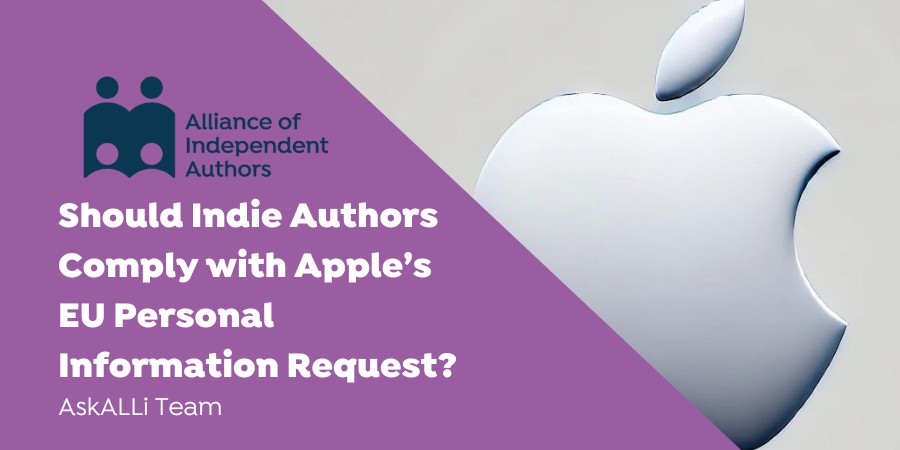Recently, and not for the first time, many authors have received requests from Apple Books to provide personal details—including their name, email, address, and phone number—when publishing books to the EU store.
This stems from Apple's interpretation of the EU Digital Services Act (DSA), which seeks to increase transparency and accountability online. But Apple's specific requirements have raised concerns in the author community, especially since other platforms like Amazon, Kobo, and Google have not been as stringent in their interpretations of this law.
At the Alliance of Independent Authors (ALLi), we recognize the dilemma this presents for authors: balancing compliance with emerging regulations while protecting your personal privacy. In this post, we’ll dive into the implications of Apple’s request, explore whether you should comply, and provide practical tips for navigating this situation.
What Is the EU Digital Services Act (DSA)?
The DSA, which went into effect in 2023, is part of the EU’s effort to regulate online spaces and ensure transparency. It applies to platforms operating in the EU, including marketplaces and digital storefronts like Apple’s Books Store. The law aims to prevent illegal activities, increase user protection, and ensure platforms maintain accurate records of sellers, especially when selling to EU customers.
One of the DSA’s stipulations is that users purchasing from online platforms should have access to clear information about the seller. This has led to a requirement for transparency, particularly with contact details. However, the way in which platforms interpret this requirement can vary, and Apple’s interpretation appears to be more stringent than others.
What Is Apple Asking for?
Apple’s request is that all authors selling in the EU Books Store must provide:
- Full name
- Email address
- Physical address
- Phone number
This information would be available for EU customers to view, which is causing concern due to privacy and security risks. Some authors are uncomfortable with their home addresses and phone numbers being publicly available, fearing harassment, spam, or worse.
Do You Have to Comply?
 Should Authors Comply with Apple’s EU personal information request? This is where things become less clear.
Should Authors Comply with Apple’s EU personal information request? This is where things become less clear.
While Apple is interpreting the DSA to mean that all this information should be publicly available, other platforms—such as Amazon and Kobo—do not currently require this level of disclosure. As such, compliance is not strictly necessary for every platform.
Here are a few key points to consider:
Apple’s enforcement: If you wish to continue selling through the Apple Books Store in the EU, you may have to comply. Non-compliance could result in your books being delisted or not available in EU markets through Apple.
Risk of non-compliance: In theory, if you do not provide this information, your sales through Apple in the EU may be blocked, reducing your book’s reach in these territories. However, it’s unclear how strictly Apple will enforce this across all accounts and whether there may be future workarounds.
Other platforms’ policies: Currently, major competitors like Amazon, Kobo, and Google do not require this level of personal detail to be made public. If Apple is your only EU sales platform, non-compliance may have a significant impact on your sales in this region.
Potential Privacy Concerns
Many authors are concerned about the privacy implications of Apple’s request. Disclosing personal details like your home address and phone number can lead to a variety of risks, including harassment, spam, stalker risks etc.
For some authors, especially those who have had security issues in the past, making this information public could feel dangerous.
For authors who use pen names, the issue of privacy is even more sensitive. While pseudonyms are typically used to maintain a degree of separation between an author’s private life and their public persona, disclosing personal information defeats the purpose of the pen name(s).
Practical Tips if You Choose to Comply
If you decide to comply with Apple’s request, here are some practical steps to protect your privacy and minimize risks:
Use a business address: Instead of your home address, consider using a PO Box or a business mailing address to maintain privacy. Many companies offer services that provide a business address without requiring you to rent physical office space.
Set up a separate business email: Rather than using your personal email, create a dedicated author or business email account for public contact. This adds a layer of separation between your private and professional communications and makes it easier to filter and monitor emails.
Get a virtual phone number: There are services that allow you to create a virtual phone number that forwards to your real phone. This way, you can receive business-related calls while keeping your personal number private.
Update your website: Make sure your website’s contact information is streamlined and professional. If you list a public-facing email or phone number, ensure it’s consistent with the details you provide to Apple.
Monitor your information: Regularly check your information online to ensure it hasn’t been misused. Set up Google Alerts for your name or book titles so that you’re notified if your personal data is being improperly shared or used.
Alternatives if You Choose Not to Comply
If you are uncomfortable providing the requested details, you may want to consider these alternatives:
Limit your distribution: If Apple is the only platform enforcing these strict regulations, consider focusing your EU distribution on other platforms like Amazon, Kobo, or Google, where these details are not required. This may limit your reach through Apple’s store, but you can still make your books available through other major channels.
Wait for clarification: The landscape may evolve with more platforms responding to the DSA. Authors who are concerned about their privacy might choose to wait for further clarification on how strictly Apple will enforce this and whether other platforms will follow suit.
Consider legal advice: If you are particularly concerned about the legal implications of complying or not complying, seek advice from a lawyer or legal service familiar with data privacy laws and the publishing industry.
Conclusion
On this issue, ALLi's stance is that compliance is a personal decision based on your level of comfort with making this information public and your dependence on Apple’s EU store for book sales.
While compliance may be necessary to continue selling through Apple in the EU, authors should weigh this against the potential privacy risks and consider practical steps to protect themselves.
We encourage ALLi authors to stay informed and consider the pros and cons before deciding. If in doubt, consult with privacy experts or legal professionals, and keep an eye on how other platforms and authors respond to these regulations.
For more advice, and to discuss your options, ALLi members can contact our expert team and join our private discussions in the member forum.




